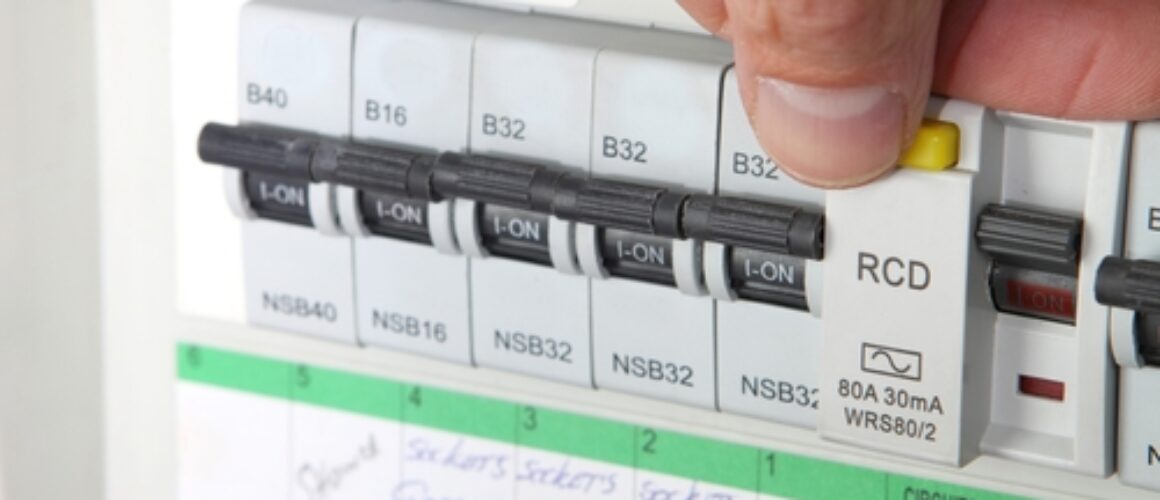Choosing The Right RCD For Maximum Safety
Residual Current Devices (RCDs) are indispensable for ensuring electrical safety by detecting and mitigating the risk of electric shock and fire hazards. Selecting the appropriate RCD for your specific requirements is crucial to maximise safety and efficiency in your electrical installations. This blog provides guidance on choosing the right RCD based on factors such as sensitivity, rated current, and installation type. Additionally, we will highlight the importance of matching RCD specifications to the needs of residential, commercial, and industrial installations.
Understanding RCD Specifications
Before delving into the selection process, it is essential to understand the key specifications of RCDs that determine their suitability for different applications:
- Sensitivity (Residual Operating Current, IΔn): This refers to the amount of current leakage that the RCD will detect before tripping the circuit. Sensitivity is usually measured in milliamperes (mA). Common sensitivity levels are 10mA, 30mA, 100mA, and 300mA. Lower sensitivity RCDs (e.g., 10mA or 30mA) are typically used in residential and personal protection scenarios, while higher sensitivity RCDs (e.g., 100mA or 300mA) are used in industrial settings where nuisance tripping must be minimised.
- Rated Current (In): This indicates the maximum current the RCD can handle without tripping under normal operating conditions. Rated current values can range from 16A to 125A or higher, depending on the application.
- Type of RCD: Different types of RCDs include Type AC, Type A, Type F, and Type B, each designed to detect specific types of residual currents. For example, Type AC RCDs detect alternating current (AC) faults, while Type A RCDs can detect both AC and pulsating direct current (DC) faults.
- Installation Type: RCDs can be installed in various configurations, such as fixed RCDs in distribution boards, socket-outlet RCDs, or portable RCDs.
Selecting the Appropriate RCD for Your Needs
When choosing an RCD, consider the specific requirements of your installation, including the sensitivity, rated current, and installation type that best suits your needs.
1. Residential Installations
In residential settings, the primary concern is protecting individuals from electric shocks and preventing electrical fires. Here are some key considerations:
- Sensitivity: For personal protection, a 30mA RCD is typically recommended. This level of sensitivity is sufficient to provide protection against electric shocks while minimising the risk of nuisance tripping.
- Rated Current: The rated current should match the maximum load of the circuit. Commonly used rated currents for residential circuits are 16A, 20A, or 32A, depending on the circuit’s requirements.
- Type of RCD: Type AC RCDs are commonly used in residential installations. However, if there are appliances that generate pulsating DC currents (such as washing machines or electronic devices), a Type A RCD may be more suitable.
- Installation Type: Fixed RCDs installed in the distribution board provide comprehensive protection for all circuits. Socket-outlet RCDs can offer additional protection for specific outlets, especially in areas prone to moisture, such as bathrooms and kitchens.
2. Commercial Installations
Commercial environments often have more complex electrical systems and higher power demands. Key considerations for selecting RCDs in commercial settings include:
- Sensitivity: A combination of 30mA RCDs for personal protection and 100mA or 300mA RCDs for fire protection and equipment safety is recommended. Higher sensitivity RCDs can be used in areas with higher risk of electric shock, such as offices and public spaces.
- Rated Current: Commercial installations typically require RCDs with higher rated currents, such as 40A, 63A, or 80A, to accommodate the larger electrical loads.
- Type of RCD: Type A RCDs are suitable for most commercial applications, especially where electronic equipment is used. In areas with complex equipment or machinery, Type F or Type B RCDs might be necessary to detect a broader range of fault currents.
- Installation Type: Fixed RCDs in the main distribution board are essential for overall protection. Additionally, portable RCDs can provide flexible protection for temporary setups, such as exhibitions or outdoor events.
3. Industrial Installations
Industrial environments pose unique challenges due to high power demands and the presence of heavy machinery. Selecting the right RCDs for these settings is crucial for safety and operational efficiency:
- Sensitivity: For general protection, 100mA or 300mA RCDs are often used to prevent fire hazards while avoiding nuisance tripping. For specific personnel protection zones, 30mA RCDs are recommended.
- Rated Current: Industrial circuits often require RCDs with higher rated currents, such as 100A or 125A, to handle the substantial electrical loads.
- Type of RCD: Type B RCDs are suitable for industrial environments where both AC and DC residual currents may be present, particularly in settings with variable frequency drives (VFDs) or photovoltaic systems.
- Installation Type: Fixed RCDs in the main and sub-distribution boards are essential for comprehensive protection. Socket-outlet RCDs and portable RCDs can provide additional safety for specific equipment and temporary installations.
Importance of Regular Testing and Maintenance
Regardless of the type and application, regular testing and maintenance of RCDs are vital to ensure their reliability and effectiveness. Periodic testing, typically every six months, helps identify any faults or degradation in performance. Many RCDs come with a test button that allows for easy verification of their operation. Additionally, professional inspections by a qualified electrician can ensure that the RCDs and the overall electrical system are in optimal condition.
Conclusion
Choosing the right RCD is essential for maximising electrical safety in any environment. By considering factors such as sensitivity, rated current, and installation type, you can select the appropriate RCD for your specific needs. Whether for residential, commercial, or industrial installations, matching RCD specifications to the requirements of the environment is crucial for effective protection against electric shocks and fire hazards.
For a wide range of high-quality RCDs and expert advice on selecting the right one for your needs, visit Electrical Discounted Supplies. Ensure maximum safety and efficiency in your electrical installations with our comprehensive selection of RCDs.




